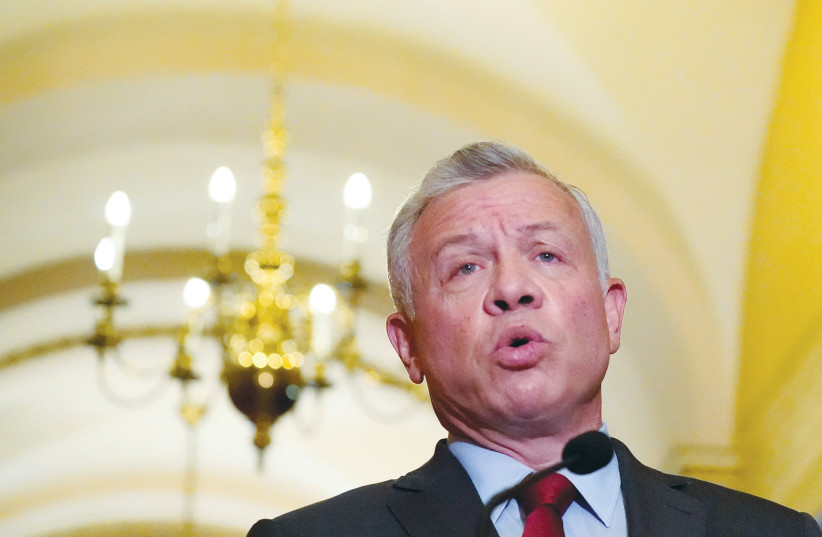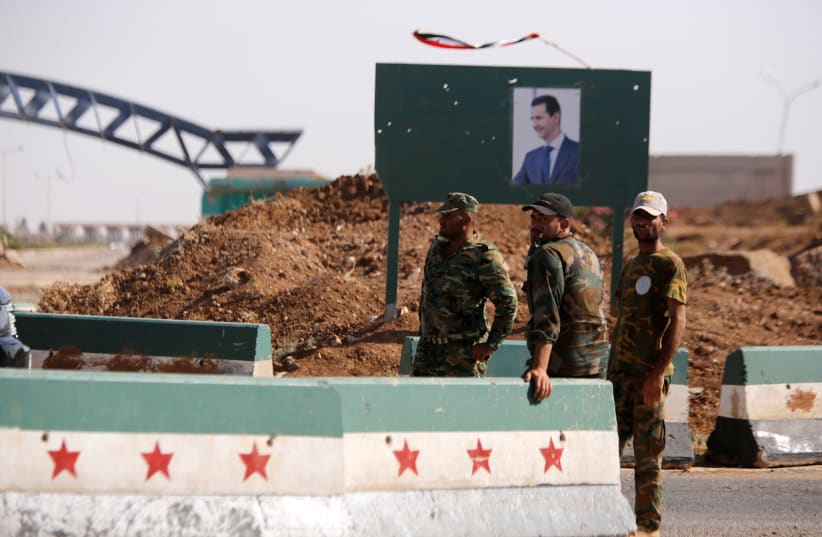If the Assad regime hoped its defense minister’s visit to Amman on Sunday would please the Jordanians, they must have been disappointed.
The leading Al Rai daily reported the visit of Ali Ayyoub and his meeting with Air Force Maj.-Gen. Yousef Huneiti, chairman of the Jordanian Joint Chiefs of Staff, in a page 2 story. The same Petra news agency report was also published in two other dailies, Ad-Dustour and Al Ghad.
King Abdullah did not meet with the Syrian minister, whose visit focused on issues of border security with Jordan.

The coverage was in stark contrast to the high profile coverage given to the September 8 visit of the Syrian minister of energy along with his Lebanese and Egyptian counterparts, reflecting Jordan’s interest in economic rather than military or political rapprochement.
Military analyst Mamoun Abu Nuwar, a retired Jordanian Air Force major general, told The Media Line the visit of the top Syrian military official was aimed at reassuring Amman that Damascus is serious about wanting to improve relations. “The blowing up of the pipeline that was aimed at supplying Lebanon with Egyptian oil has worried Jordan,” he said.
Abu Nuwar also notes that Syria badly wants the border between the two countries to reopen.
“Borders are a sign of sovereignty and until they are opened for regular movement of people and goods, the issue of Syria’s sovereignty will continue to be in doubt. They have a big problem in dealing with the various militias and I think the visit of the [former Syrian] chief of staff is aimed at outlining the steps Syria is planning to take to curb them and to reassert control, especially in areas of southern Syria that border Jordan,” Abu Nuwar said.
Tareq Khoury, a former Jordanian member of parliament, praised the visit, saying it came as part of the effort to break the ice and return bilateral relations to normal.
“It follows the recent visit by the king to Washington where he was able to get a waiver of the Caesar act [to allow the supply of fuel and electricity to Lebanon through Syria] similar to the waiver Jordan got regarding the sanctions on Iraq. I think the visit is improving things on the economic and political levels and we will see more engagement in the near future,” the pro-Syrian politician told The Media Line.
Agyead Abo Zayed, a Syrian journalist based in Jordan who presents the Syrians Among Us program on Amman’s Radio Al-Balad, told The Media Line that “although this is the first such visit since 2011 for a high-level military official, the main topics of discussions were the border issue and the problem of drug smuggling.”
Abo Zayed said the Arab Gas Pipeline, which runs from El-Arish in Egypt through Jordan, and enters Syria through the border town of Daraa, was also discussed, as Ayyoub came to “reassure his Jordanian counterpart that the pipeline will be safe.”
Relations between Jordan and Syria have deteriorated since 2011, when Damascus accused Amman of allowing travel by and arming of fighters bent on bringing down the regime. As early as 2011, Abdullah was the first Arab leader to call on Assad to step down, and in 2014, Jordan kicked out the Syrian ambassador to the kingdom, Bahjat Suleiman.
But despite all that, Jordan never officially broke relations with Damascus, and the Syrian embassy in Amman remained open, largely to provide consular services to the 1.2 million Syrian refugees who have flooded into Jordan since the civil war in their country began. And since last July, the king has called for dialogue with the Syrian president, telling CNN that Assad and his regime will be staying in power for a long time.
Jordan closed its borders in 2017 because of the security situation following suicide attacks by ISIS jihadists against the country’s soldiers. In 2018, however, Jordan led a US- and Russian-sponsored effort to settle problems between the Syrian opposition and the regime in Damascus.
What Jordan fears most is the Iranian presence near its northern borders. The king has long warned of the dangers posed by a Shiite crescent running from Tehran to Beirut via Iraq and Syria.
